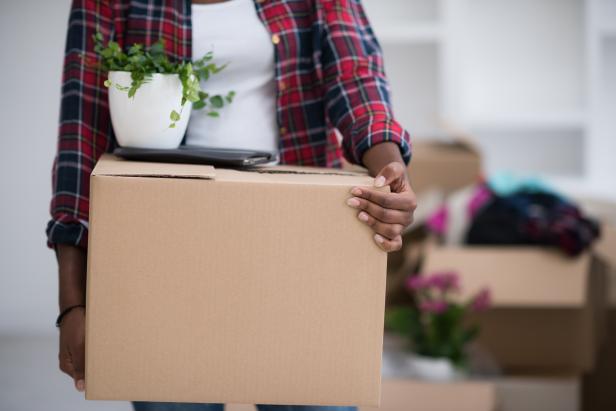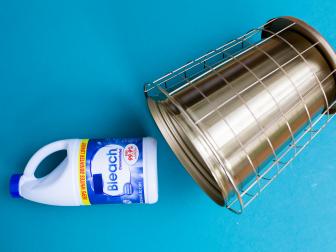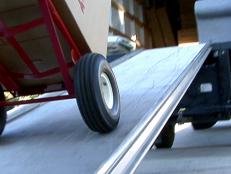Moving Checklist
Use this week-by-week checklist to plan your move to a new home.
When you make the decision to move, the clock starts ticking until moving day. But don't worry, we can help. This is a handy checklist of major tasks you should tackle before you move.

Shutterstock/dotshock
The tasks to complete a full two months beforehand might seem trivial now, but staying on schedule will help you avoid last-minute headaches. Time will be at a premium on the days right before your move, so be diligent in checking off these tasks.
60 Days Before You Move
This is the time to start strategically planning your move step-by-step to alleviate the stress of last-minute packing and planning.
Research Movers
Research movers and hire one as soon as you know your moving date. Movers can book up fast certain times of the year, so get on their schedule as soon as you can.. Here are some tips on choosing the right mover:
- Talk to family and friends for recommendations on moving companies.
- Get quotes from at least three moving companies and make sure they do in-home assessments so your quote is as accurate as possible.
- Check with the Better Business Bureau regarding the movers.
- Learn your rights and responsibilities when working with a mover from the U.S. Department of Transportation.
- Find out what the mover's responsibilities are for damages that may occur to your belongings.
Your Move
Where to Donate Gently-Used Items 15 Photos
Instead of overwhelming your local thrift store, spread the love and donate these in-demand items to a charity.
- Get appraisals on your expensive items so you can insure them for your move.
- Determine how many packing supplies you'll need and designate a room where you can begin to store and organize them and other items that will assist you in your move.
- Research your new community, including schools and nearby doctors and hospitals, so you know as much as possible before you move.
- Got enough people to drive your cars to your new home? If not, you'll need a car mover.
- If you are being transferred by work, understand your company's moving policy.
- Pare down — use up, sell, recycle or donate anything you don't want to move. Make it a family project.
- Consider holding a garage sale prior to your move; this will help you reduce the amount of stuff you need to move and earn some extra cash on the side.
- Make a moving folder or booklet — include an inventory of your household items with a video or photos.
- Do you need a storage unit? If so, start researching your options now.
Your Records
- Contact your insurance agent to transfer medical, property, fire and auto insurance policies. Be sure to ask about coverage while you're in transit.
- Create a designated folder for moving-related expenses where you can file all receipts. This will come in handy as many moving expenses are tax deductible.
- Obtain an IRS Change of Address form, Form 8822, by calling (800) 829-1040 or visiting the IRS website. There you can find form 8822 and most other IRS tax forms; e.g., Form 3903 to help deduct moving expenses.
- Transfer school records. Begin the process of registering for schools in your new location.
- Notify old and new schools and arrange for the transfer of school records. Begin the process of registering for schools in your new location.
- Notify doctors and dentists of moves, and seek referrals. Collect all medical, dental and school records. Keep these in a safe place.
- Transfer organization memberships to your new hometown.
- Research banks in the area you will be living in if you must switch banks and establish accounts if needed.
- Contact or visit your local post office to obtain a change of address form. You can also obtain this form online at the Postal Service website.
Your Family and Pets
- Make travel arrangements for you and your family. Whether renting a car, scheduling a flight or reserving a hotel room, book a time that will give you flexibility in case anything goes awry. Be sure to arrive in your new location well before your movers' scheduled arrival.
- Schedule any upcoming pet health exams and get recommendations for veterinarians in your new town. Arrange to get your pets' medical records transferred as well.
Quick Tips
- Unless you're buying new packing materials, keep an eye out of for used items that could be used for packing, like old towels and sheets that could be used as packing material. Do any neighbors have packing boxes they no longer need? Look for offers of free boxes in local social media groups.
30 Days Before You Move
Your Move
- By this point, you should have already received estimates and hired a mover. Check with your mover to confirm all the details are set, including insurance coverage. If you are packing on your own, get the right supplies.
- Make the arrangements to connect and disconnect your cable, internet, electric and any other services you currently use and arrange for service at your new home.
- If you need new blinds, curtains or furniture for your new home, buy them now and arrange for them to arrive at your new home when the rest of your things do.
- Start planning where things will go in your new home.
- Create an inventory of your stuff so you can compare it against the moving company's list. This will ensure you don't lose anything in the move. It's also a good aid in determining how much moving insurance you need.
- Draw up a plan for how to handle any appliances you are moving.
- Start packing things you won't need before the move, like seasonal items such as summer or winter gear.
- Arrange childcare and pet care for the day of your move or identify a place where they can stay safe during the move itself.
- Make a packing plan — assign everyone a task and involve the kids.
- Make an unpacking plan for the new home — who does what and diagram where the furniture goes. The movers will not rearrange your furniture for you, so think that through.
- Make sure your car is ready for the trip if you’re driving it to the new location.
Your Records
- Give a change of address to the following: Banks, schools, friends and family, insurance company, doctors and specialists, cell phone company, credit card companies, current and new employers, and magazine and newspaper subscriptions.
- Let service providers — landscapers, cleaning services — know you're moving and look for new ones in your new hometown.
Your Family and Pets
- If time permits, you may also want you and your family to go to the dentist and/or eye doctor for your routine check-ups. It may take a while to find new family dentists and doctors in your new city, so it can be a good idea to take care of these things while you still have access to professionals you trust.
- Encourage children to make an address book of friends.
Quick Tips
Driving to your new house? Make sure your car's ready for the trip and that the movers have directions if they need them.
14 Days Before You Move
Your Move
- Begin cleaning any emptied rooms in your house such as closets, basements or attics and check to make sure you did not leave anything unpacked.
- Moving plants? Check on their special moving needs.
- Make arrangements to clean your new home, and the home you're leaving. Also, arrange for any services for your new home that will be easier to do before your things arrive: carpet-cleaning, wood floor cleaning, painting, etc.
- Apartment dwellers should make arrangements for movers to use elevator on move day.
Your Records
- Find new pharmacies where you can transfer your family's prescriptions. Make sure you have enough required medication in case you don't locate a new pharmacist/doctor immediately.
- Organize important documents — wills, passports, deeds, financial statements — to carry with you when move; make electronic copies but carry the originals with you.
Your Family and Pets
Is your pet ready for the move? Make sure you have transportation arranged and that you have someone who can watch the pet during the move. Also, make sure the pet is up to date on its vaccinations.
Quick Tips
- Collect valuable items such as jewelry or heirlooms and keep them separate from the rest of your packed belongings so you don't risk losing them.
- Return any borrowed items, such as library books, and collect any clothing you may have taken to be dry-cleaned.
One Week Before You Move
Your Move
Can You Toss It? 10 Photos
Learn which items you can safely toss in the trash and which require a couple extra steps for your safety and to help our environment.
- Pack any items you haven't yet packed. Your final week at home has the potential to be very stressful; don't put things off until the last minute.
- As you're packing, be sure you're labeling each box for where it goes in your new home. If you don't do this now, you might very well forget what's in each box. Also, where applicable, mark the boxes "fragile," "do not load," or "load last."
- Call your mover and confirm your move date and make any special arrangements for items like a piano.
- Arrange for payment of movers. A $20 to $25 cash tip per mover is usual but this can vary by area.
- Confirm closing/move-in dates with your real estate agent and confirm dates with your storage people.
- Discuss a contingency plan if the movers are late to arrive at your new home. Where will you sleep?
- Disconnect and disassemble your computer and peripherals. Back up your computer files on an external drive or use a cloud-based backup service. You should plan to take your computer equipment in the car or whatever mode of transportation you will be using to get to your new home. Exposure to extreme temperatures can damage your computer equipment.
- Properly dispose of hazardous and flammable items that can't be transported such as paint, chemicals, aerosol cans and oil, as well as weed killers. Discard propane tanks from grills.
- Double check dates for when utilities will be hooked up at the new home and turned off at your current home.
Your Records
- Make sure all scheduled deliveries (newspaper, etc.) have been canceled or redirected to your new home.
- Need to open a new banking account. Don't close your old one until you move. If you bank online, be sure to update your address for statement delivery.
- Gather all keys, alarm codes, garage door openers and warranties and place them in a folder along with your contact information so you can hand them over to the new owner or real estate agent.
Your Family
- Start preparing your kids for the move. Talk about it, and engage them in the process — maybe they can help color-code boxes to help the movers know where stuff goes.
- Empty all lockers at school, work or at your gym.
- Return any borrowed items from friends (or the library).
Quick Tips
Think about quick and easy meals that use up the remaining food in your refrigerator.
Moving Week
Your Move
- Put together a moving day survival kit with items for the trip and immediately when you arrive at your new home. These items include toilet paper, snacks, bottled water, dishes, toiletries, towels, a few days' worth of clothes. Be sure to plan for the contingency that your household items may arrive a few days late if you are doing a long-distance move.
- Double check any arrangements you might have made to transport your pet. Do you have proper travel gear?
- Write out a list for your movers of things they'll need: phone numbers, exact moving address and detailed directions.
- Check the inventory list and sign it. Put your copy in your moving folder.
- Read the Bill of Lading carefully and sign it, if it is correct.
- Make sure you have the moving company's contact information with you in your moving folder.
- If you don't have professional cleaners coming in, make sure you clean your home before leaving.
- Pack a moving-day box of things you'll be moving yourself so you have access to them right away. Cell phone, light bulbs, tool kit, scissors, flashlight, trash bags, paper towels, toilet paper, aspirin and bed linens. Make sure you have extra packing materials on hand for things that arise last minute.
- Pack pet food and pet litter.
- Be sure you have cash on hand for the move. Find out if you'll owe money after the move and find out what form of payment the movers accept.
- On moving day, do the walk-through with your real estate agent. Make sure everything's where it should be. Also, ask for appliance manuals and such.
- In your new home, tape names to doors to assist movers. Map out the floor layout so movers know what's going where. Finally, prepare your new home to prevent any damage as furniture comes in.
Quick Tips
- Empty, clean and defrost your refrigerator/freezer and use baking soda to rid it of any foul odors.
- Notify the police in your town if your home will be uninhabited for a long period of time.
- Before you move, mow your lawn one last time, especially if your home will not be unoccupied immediately after your departure.
- Make sure you know what to do with final trash.
One Week After You Move

- Get your kids involved in the unpacking process and help them find activities in your new town.
- Did you get your moving deposits back yet?
- Make sure you have fire extinguishers and fire detectors in your new home.
- Do any quick repair work that needs to be done if you didn't do it before moving in.
- Tackle some fun first projects to help make your house a home, like hanging pictures and other simple projects
- Explore the new town — get acquainted, find out where everything is, etc.
- Replace the locks if you're uneasy about keeping the locks that came with the house.
- Check on licenses for pets.
- Update your address for all these: voter registration, driver's license, tax forms, new bank account, etc.
- Start thinking about the larger home-renovation projects you'd like to get started and prioritize them.
















































